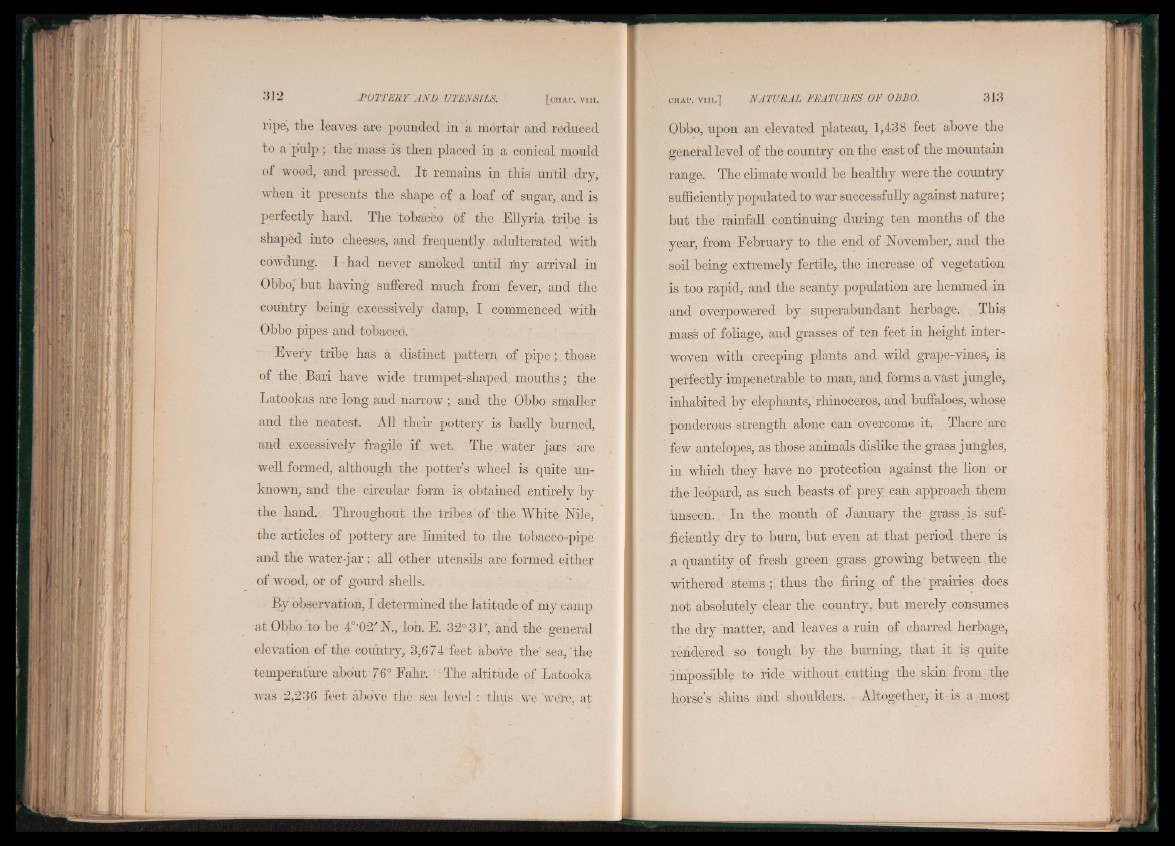
ripe, the léaves are pounded in a mortar and reduced
to a pulp ; the mass is then placed in a conical mould
of wood, and pressed. I t remains in this until dry,
when it presents the shape of a loaf of sugar, and is
perfectly hard. The 'tobacco of the Ellyria tribe is
shaped into cheeses, and frequently adulterated “with
cowdung. I had never smoked until toy arrival in
Obbo, but having suffered much from fever, and the
country being excessively damp, I commenced with
Obbo pipes and tobacco.
Every tribe has à distinct pattern of pipe ; those
of the Bari have wide trumpet-shaped, mouths ; the
Latookas are long and narrow ; and the Obbo smaller
and the neatest. All their pottery is badly burned,
and excessively fragile if wet. The. water jars are
well formed, although the potter’s wheel is quite'unknown,
and the circular form is obtained entirely by
the hand. Throughout the tribes 'of the White Nile,
the articles of pottery are limited to the tobacco-pipe
and the water-jar : all other utensils are formed, either
of wood, or of gourd shells.
By observation, I determined the latitude of my earnp
at Obbo To be 4o,02/ N., Ion. E. 32° 3F,. and the general
elevation of the country, 3,674 feet above the; sea,’the
temperature about 76° Fahr. The altitùde of Latooka
was 2,236 feet àbove thé sea level : thus w e ’were, at
Obbo, upon an elevated plateau, 1,438 feet above the
general level of the country on the east of the mountain
range. The climate would be healthy were the country
sufficiently populated to war successfully against nature;
but the rainfall continuing during ten months of the
year, from February to the end of November, and the
soil being extremely fertile, the increase of vegetation
is too rapid, and the scanty population are hemmed in
and overpowered by superabundant herbage. This
mass of foliage, and grasses of ten feet in height interwoven
with creeping plants and wild grape-vines, is
perfectly impenetrable to man, and, forms a vast jungle,
inhabited by elephants, rhinoceros, and buffaloes, whose
ponderous strength alone can overcome it. There are
few antelopes, as those animals dislike the grass jungles,
in which they have no protection against the lion or
the leopard, as such beasts of prey can approach them
unseen. In the month of January the grass is sufficiently
dry to burn, but even at that period there ‘is
a quantity of fresh green grass growing between the
withered , stems; ' thus the firing of the prairies does
not absolutely clear the country, but merely consumes
the dry matter, and leaves a ruin of charred herbage,
rendered so tough by the burning, that it is quite
impossible to ride without cutting the skin from the
horse’s sh in s and shoulders. Altogether, it is a most